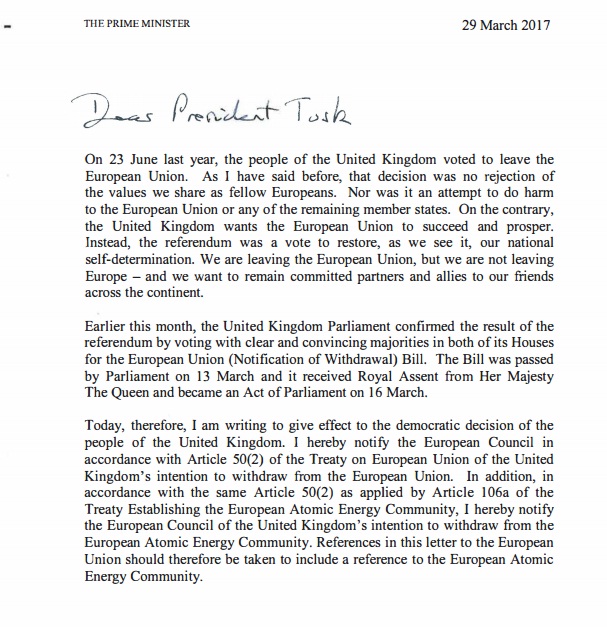Yesterday, the Prime Minister of the UK, Theresa May has sent a six-page letter to the President of the European Council Donald Tusk expressing the UK’s intention to exit the European Union. The Brexit process has now officially begun and the UK is on its way becoming the first country ever to exit the European Union since its creation decades ago. The full letter of the Prime minister is attached here. While we urge our readers to go through these six pages and make their own understandings of it, here are the highlights from us, if they are unable to do so, (all text below are exact quotes from the letter)
- On 23 June last year, the people of the United Kingdom voted to leave the European Union. As I have said before, that decision was no rejection of the values we share as fellow Europeans. Nor was it an attempt to do harm to the European Union or any of the remaining member states. On the contrary, the United Kingdom wants the European Union to succeed and prosper. Instead, the referendum was a vote to restore, as we see it, our national self-determination.
- I hereby notify the European Council in accordance with Article 50(2) of the Treaty on European Union of the United Kingdom's intention to withdraw from the European Union. In addition, in accordance with the same Article 50(2) as applied by Article 106a of the Treaty Establishing the European Atomic Energy Community, I hereby notify the European Council of the United Kingdom's intention to withdraw from the European Atomic Energy Community.
- We want the United Kingdom, through a new deep and special partnership with a strong European Union, to play its full part in achieving these goals. We therefore believe it is necessary to agree the terms of our future partnership alongside those of our withdrawal from the European Union.
- From the start and throughout the discussions, we will negotiate as one United Kingdom, taking due account of the specific interests of every nation and region of the UK as we do so. When it comes to the return of powers back to the United Kingdom, we will consult fully on which powers should reside in Westminster and which should be devolved to Scotland, Wales and Northern Ireland. But it is the expectation of the Government that the outcome of this process will be a significant increase in the decision-making power of each devolved administration.
- The United Kingdom wants to agree with the European Union a deep and special partnership that takes in both economic and security cooperation.
- In security terms a failure to reach agreement would mean our cooperation in the fight against crime and terrorism would be weakened. In this kind of scenario, both the United Kingdom and the European Union would of course cope with the change, but it is not the outcome that either side should seek. We must therefore work hard to avoid that outcome.
- United Kingdom does not seek membership of the single market: we understand and respect your position that the four freedoms of the single market are indivisible and there can be no "cherry picking". We also understand that there will be consequences for the UK of leaving the EU: we know that we will lose influence over the rules that affect the European economy. We also know that UK companies will, as they trade within the EU, have to align with rules agreed by institutions of which we are no longer a part – just as UK companies do in other overseas markets.
- …many citizens of the remaining member states living in the United Kingdom, and UK citizens living elsewhere in the European Union, and we should aim to strike an early agreement about their rights.
- In order to avoid any cliff-edge as we move from our current relationship to our future partnership, people and businesses in both the UK and the EU would benefit from implementation periods to adjust in a smooth and orderly way to new arrangements.
- In particular, we must pay attention to the UK's unique relationship with the Republic of Ireland and the importance of the peace process in Northern Ireland. The Republic of Ireland is the only EU member state with a land border with the United Kingdom. We want to avoid a return to a hard border between our two countries, to be able to maintain the Common Travel Area between us, and to make sure that the UK's withdrawal from the EU does not harm the Republic of Ireland.
- We should begin technical talks on detailed policy areas as soon as possible, but we should prioritise the biggest challenges.
- This should be of greater scope and ambition than any such agreement before it so that it covers sectors crucial to our linked economies such as financial services and network industries.
- We should therefore prioritise how we manage the evolution of our regulatory frameworks to maintain a fair and open trading environment, and how we resolve disputes.
- We recognise that it will be a challenge to reach such a comprehensive agreement within the two-year period set out for withdrawal discussions in the Treaty. But we believe it is necessary to agree the terms of our future partnership alongside those of our withdrawal from the EU.



 FxWirePro: Daily Commodity Tracker - 21st March, 2022
FxWirePro: Daily Commodity Tracker - 21st March, 2022  Gold Prices Fall Amid Rate Jitters; Copper Steady as China Stimulus Eyed
Gold Prices Fall Amid Rate Jitters; Copper Steady as China Stimulus Eyed  Best Gold Stocks to Buy Now: AABB, GOLD, GDX
Best Gold Stocks to Buy Now: AABB, GOLD, GDX 
































